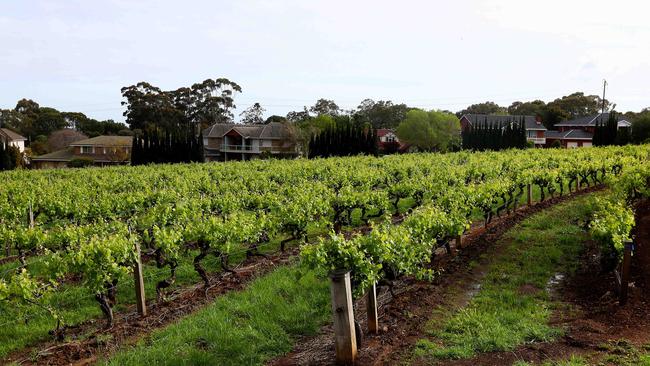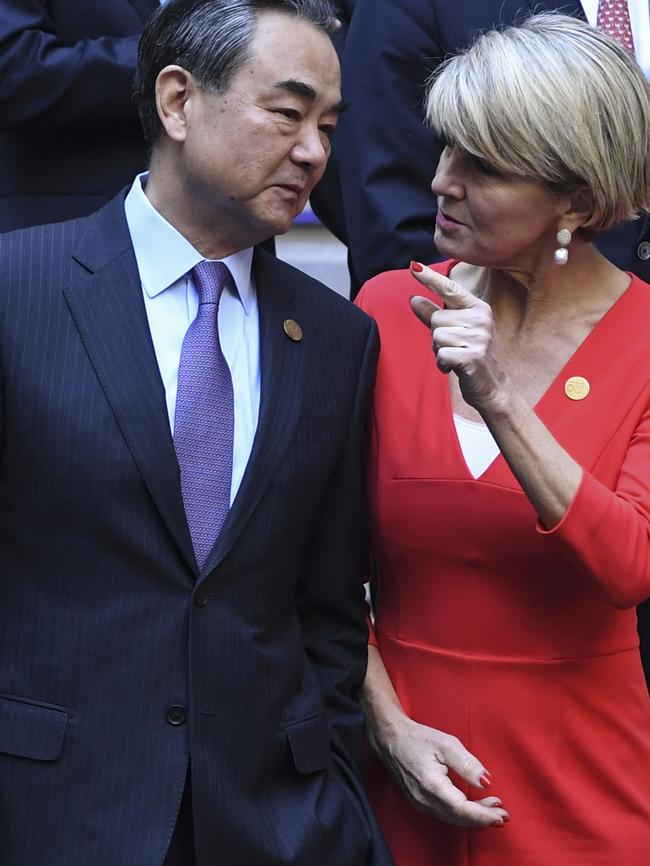Wine trade corked as China retaliates in spat over meddling
Spat over Chinese meddling in Australian politics has led to cases of wine piling up at ports amid demands for deeper trade cuts.

A deepening spat over allegations of Chinese meddling in Australian politics has led to cases of wine piling up at Chinese ports and nationalists calling for tougher trade retaliations.
The episode shows how China is willing to use its economic leverage to force foreign governments to reverse positions it views as antagonistic. It has deployed similar tactics in its trade fight with President Donald Trump, stepping up customs inspections of US cars and soybeans.
Treasury Wine Estates, one of the world’s biggest winemakers, says its products are being stalled because of new Chinese customs rules apparently targeting Australia-made wines.
“Chinese officials have introduced new and different verification and certification processes,” Chief Executive Michael Clarke said.
He declined to detail how many cases were affected but said the new hurdles were being applied not just to Treasury Wine but a number of companies and industries. The common feature, he said, was that all the products were from Australia. China’s Customs Administration didn’t immediately respond to questions.

The vintner — whose brands range from the mass-market US-made Beringer to $1,000-a-bottle Penfolds Grange from Australia — has been upping its bets on Asian drinkers to become its biggest source of earnings.
The new customs requirements, applied since April, come as Canberra considers a series of bills that would strengthen the country’s espionage laws, outlaw foreign political donations and criminalise efforts to interfere in Australian democracy. That legislation was a response to concerns that were raised by Australia’s domestic spy chief, Duncan Lewis, that political donors acting on behalf of Beijing were becoming a major risk to national security.
Beijing denies it has meddled in Australia’s domestic affairs. In December, it accused Australian politicians and media outlets of fanning “anti-China hysteria.”
“They seem to have selected a few of the bigger players,” said John Casella, chief executive of Casella Wines, maker of the mass-market Yellow Tail wine with a Kangaroo on the label. “I’d describe it as a go-slow, a slowdown on the port documentation, that sort of thing.” He declined to detail the impact on his company.
Australia faces an awkward diplomatic balancing act in trying to address concerns about political interference while relying heavily on China for its economic wellbeing. Australia’s two-way trade with Beijing last year was worth about AUD$175 billion, nearly three times the value of its trade with the US and about a quarter of the country’s total. Australian wine exports to China rose 51% to about $990 million in the year through March — ranking it second only to France among China’s top sources of imported wines, according to Wine Australia, an industry body.
China’s Foreign Minister Wang Yi last week urged Canberra to take a more-constructive approach to get the trade relationship back on course.
“If Australia sincerely hopes that the relations between the two countries will return to the right track … they must break away from traditional thinking, take off their coloured glasses, and look at China’s development from a positive angle,” he said in translated remarks after meeting Tuesday with his Australian counterpart, Julie Bishop. She raised trade issues, including wine shipments, during the meeting.

When relations with South Korea were frayed by Seoul’s deployment of a US missile defence system that China vehemently opposes, Beijing appeared to use its economic clout as its largest trading partner to restrict the flow of Chinese tourists to South Korea. Lotte Group, a South Korean conglomerate that allowed Seoul to use some of its land to deploy the missile system, had dozens of its supermarkets in China closed. China has denied it retaliated against Lotte.
Norway suffered a similar freeze on salmon exports to China after the Nobel Peace Prize was awarded to imprisoned human-rights activist Liu Xiaobo in 2010. German Foreign Minister Sigmar Gabriel said in February that China was using its multibillion-dollar “Belt and Road” infrastructure program to promote its own authoritarian values through a policy of “sticks and carrots.”
China’s nationalist Global Times newspaper urged Beijing on Wednesday to slash Australian trade, including wine and beef, by as much as $10 billion a year saying a shift to US goods wouldn’t only punish Australia but help meet Mr Trump’s demand for a narrowing of China’s trade surplus with the US.
Pat Hutchinson, chief executive of the Australian Meat Industry Council, fears his industry is “collateral damage” as a deal to increase beef exports to China appears stalled amid the diplomatic spat. Beef exports fell nearly 14% last year after China banned imports from six Australian meat works over what it said were labelling issues.
Peter Drysdale, an expert on China-Australia relations at Australian National University, said the dispute with Beijing is “no routine spat.” “Prime Minister Malcolm Turnbull and foreign minister Julie Bishop have lost control of the China relationship, unable to articulate Australia’s own national strategic interests under geopolitical pressure,” he said.
Treasury Wine’s Mr. Clarke said he believes his company can work through the current problems. “We don’t see any reason why this is going to be a long-term issue,” he said.
Still, Hugh White, a China expert at Australian National University, said Canberra is focused on political meddling, but more important now is Beijing’s “overt pressure” over trade.
“That’s why Australian companies have problems with Chinese customs,” he said. “That is China overtly pushing back on policies they don’t like, and we are going to see a lot more of that in future.”
The Wall St Journal



